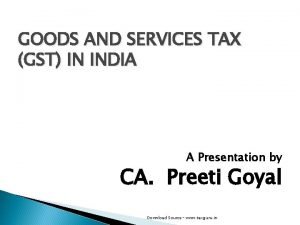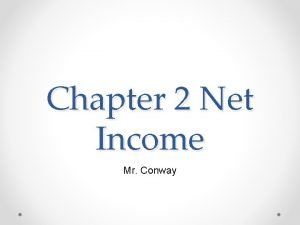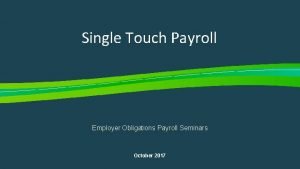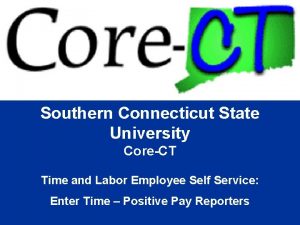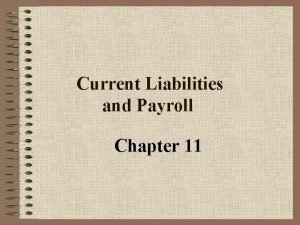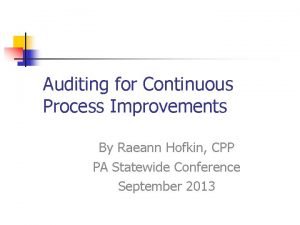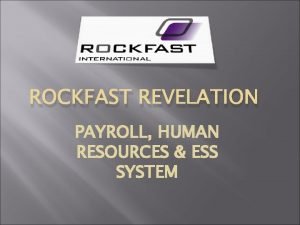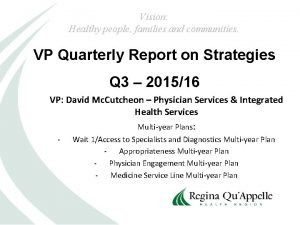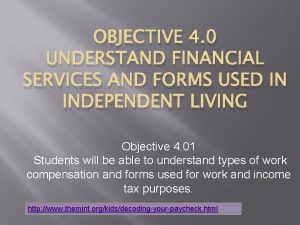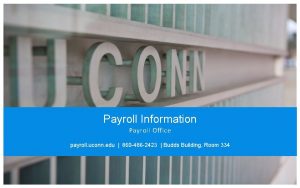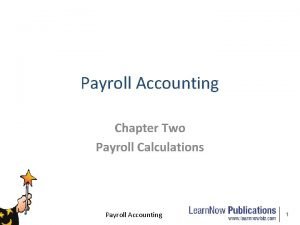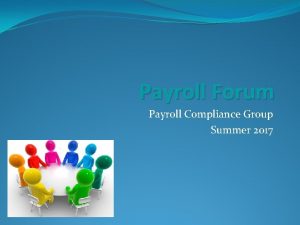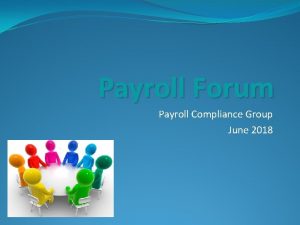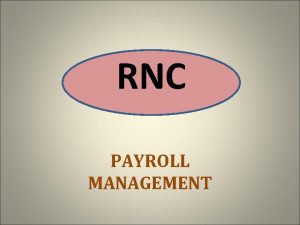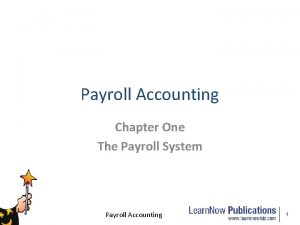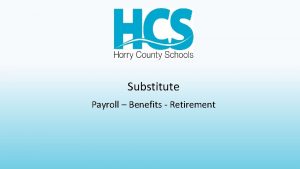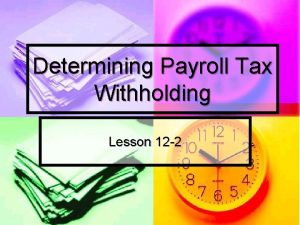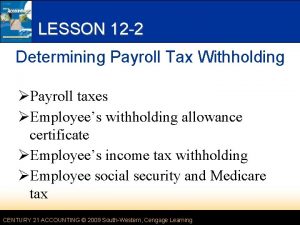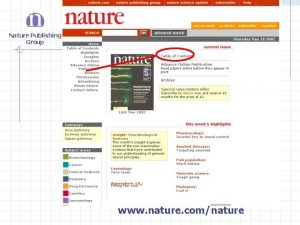PAYROLL TAX Nature of Payroll Tax Payroll tax



















- Slides: 19

PAYROLL TAX

Nature of Payroll Tax Payroll tax is a State-levied tax paid or payable on an organisation's gross payroll in excess of a tax free threshold ( also known as the general exemption or business concession ) Payroll tax is self-assessed. The rate of tax varies from state to state. Lodgement and payment must be by the 7 th day of the following month. The payroll tax year 1 st July to 30 th June.

Registration for Payroll Tax Every employer whose gross annual wages exceeds the state threshold must register. Exception ACT. If a company operates Australia wide, each division in each state will pay a different rate of tax and may have to register at different times. An employer must register for payroll tax when the gross Australian/state wages exceed the monthly threshold. In most states this must occur within 7 days of the month when wages exceed the threshold

Wages and Salaries. Commission. Bonuses. Allowances and Benefits paid or payable. Directors Fees. Fringe benefits.

Payments not Subject to Payroll Tax Workers compensation payments. Reimbursement of employees business expenses. In some states payments to apprentices and trainees. Payments for leave to serve the Defence Forces. Travel and accommodation allowances.

Exempt Employers Religious Institutions. Public Hospitals and non-profit hospitals. Charities. Non-profit organisations. Public Benevolent Societies. Primary and Secondary Education Bodies. Local Councils non-business activities.

The General Exemption, or business concession (BC), is the tax-free portion (threshold) of the total gross payroll of an organisation. Wages have to exceed this specified amount before a company is liable to pay any payroll tax

Payroll Tax Rates 14/15 rates State Annual Gross Taxable Wages Tax Rate VIC $550, 000 and above 4. 9% NSW $750, 000 and above 5. 45% WA $750, 000 and above 5. 50% TAS $1, 010, 000 and above 6. 10% ACT $1, 750, 000 and above 6. 85% NT $1, 500, 000 and above 5. 50% QLD $1, 100, 000 and above 4. 75% SA $600, 000 and above 4. 95%

Lodgement Payroll tax is levied on the gross payroll of the previous month. In some states, each month registered businesses receive a return form and worksheet to calculate payroll tax due and the previous months assessment advice.

Calculation of Payroll Tax The formula used to calculate the payroll tax payment for Non-group employers is: Payroll Tax = ( Gross monthly wages - General Exemption ) x Tax Rate CHALLENGE for NSW(check) • What is gross monthly wages? • What is the monthly general exemption?

OSR WEBSITE

NSW PAYROLL TAX www. osr. nsw. gov. au

Grouping Method of registration varies if the employer is considered to be part of a group For grouping to be applied at least one of the following need to be satisfied: Employees are shared between businesses or Control is more than 50 %.

Grouping

Calculation of Payroll Tax ( non-group employers in more than one state ) If payroll tax is paid in more than one state by non-group employers the general exemption needs to be determined, and apportioned between the states where the tax is being paid. Formula Business Concession (apportioned) = State Payroll Total Australian Payroll x Business concession

Calculation of Payroll Tax Group Employers who are the NGE/ DGE with interstate wages Formula Business Concession = BC - Total Interstate Wages x BC Total Australian Wages • • • If an employer is a member of a group but not the NGE they receive no business concession. i. e. they payroll tax on their full payroll without any BC. If there are no interstate wages, do not adjust the B. C.

Annual adjustment return At the end of the financial year, an annual reconciliation of payroll tax needs to be completed. • Any shortfalls should be paid any overpayments will incur a refund. • Annual adjustment returns must be lodged by 21 st of July each year.

Objections • Where a person is dissatisfied with their assessment, an objection may be lodged within 60 days after the date of assessment in most states. • The objection must be in writing and state the reasons why the objection was lodged. • If the person is dissatisfied with the result of the objection, they can lodge an appeal with the Supreme Court within 60 days from the service of the decision.

Penalties If an employer • Fails to register as and when required • Fails to lodge returns and payments on time • Underpays the due tax • Understates the wages in the returns • Provides any false or misleading information
 Payroll tax liability journal entry
Payroll tax liability journal entry Nature and nature's laws lay hid in night meaning
Nature and nature's laws lay hid in night meaning Nature nature controversy
Nature nature controversy Gst conclusion
Gst conclusion Find the local tax deducted: $456 biweekly, 2 1/2 % tax.
Find the local tax deducted: $456 biweekly, 2 1/2 % tax. Rea diagram revenue cycle example
Rea diagram revenue cycle example Single touch payroll seminar
Single touch payroll seminar Nyu payroll
Nyu payroll Aanbesteding payroll onderwijs
Aanbesteding payroll onderwijs Corect time
Corect time If a company uses a special payroll bank account:
If a company uses a special payroll bank account: Raeann hofkin
Raeann hofkin Pegasus payroll rti
Pegasus payroll rti Ess payroll accounting
Ess payroll accounting Elaun dg 54
Elaun dg 54 Rqhr payroll
Rqhr payroll Sbs payroll
Sbs payroll Datacore technologies pvt ltd
Datacore technologies pvt ltd Payroll card
Payroll card Payroll outsourcing definition
Payroll outsourcing definition



